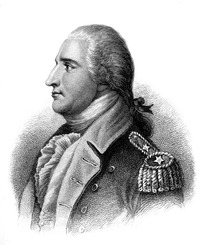
Benedict Arnold (January 14, 1741 [O.S. January 3, 1740] – June 14, 1801) was a general during the American Revolutionary War who originally fought for the American Continental Army but defected to the British Army. While a general on the American side, he obtained command of the fort at West Point, New York, and plotted to surrender it to the British forces. After the plot was exposed in September 1780, he was commissioned into the British Army as a brigadier general.
Born in Connecticut, Arnold was a merchant operating ships on the Atlantic Ocean when the war broke out in 1775. After joining the growing army outside Boston, he distinguished himself through acts of intelligence and bravery. His actions included the Capture of Fort Ticonderoga in 1775, defensive and delaying tactics despite losing the Battle of Valcour Island on Lake Champlain in 1776, the Battle of Ridgefield, Connecticut (after which he was promoted to major general), operations in relief of the Siege of Fort Stanwix, and key actions during the pivotal Battles of Saratoga in 1777, in which he suffered leg injuries that ended his combat career for several years.
Despite Arnold's successes, he was passed over for promotion by the Continental Congress while other officers claimed credit for some of his accomplishments. Adversaries in military and political circles brought charges of corruption or other malfeasance, but most often he was acquitted in formal inquiries. Congress investigated his accounts and found he was indebted to Congress after spending much of his own money on the war effort. Frustrated and bitter, Arnold decided to change sides in 1779, and opened secret negotiations with the British. In July 1780, he was offered, continued to pursue and was awarded command of West Point. Arnold's scheme to surrender the fort to the British was exposed when American forces captured British Major John André carrying papers that revealed the plot. Upon learning of André's capture, Arnold fled down the Hudson River to the British sloop-of-war Vulture, narrowly avoiding capture by the forces of George Washington, who had been alerted to the plot.
Arnold received a commission as a brigadier general in the British Army, an annual pension of £360, and a lump sum of over £6,000. He led British forces on raids in Virginia, and nearly captured Thomas Jefferson, and against New London and Groton, Connecticut, before the war effectively ended with the American victory at Yorktown. In the winter of 1782, Arnold moved to London with his second wife, Margaret "Peggy" Shippen Arnold. He was well received by King George III and the Tories but frowned upon by the Whigs. In 1787, he entered into mercantile business with his sons Richard and Henry in Saint John, New Brunswick, but returned to London to settle permanently in 1791, where he died ten years later.
Because of the way he changed sides, his name quickly became a byword in the United States for treason or betrayal. His conflicting legacy is recalled in the ambiguous nature of some of the memorials that have been placed in his honor.